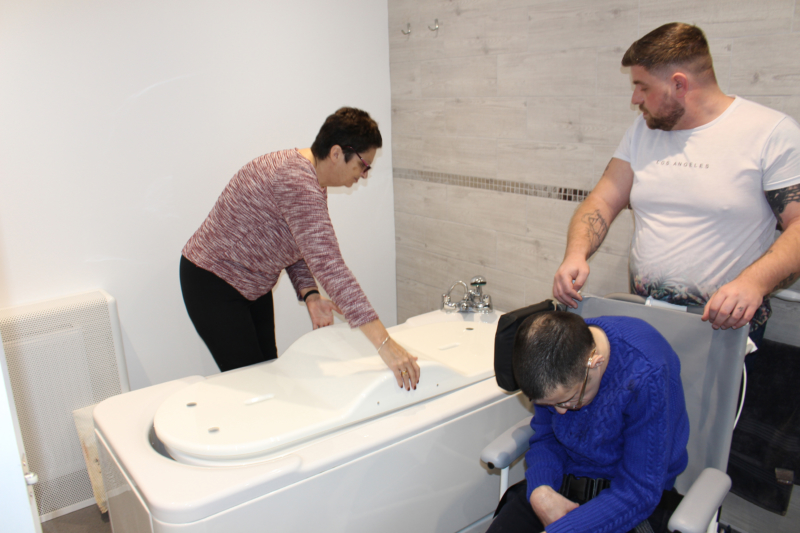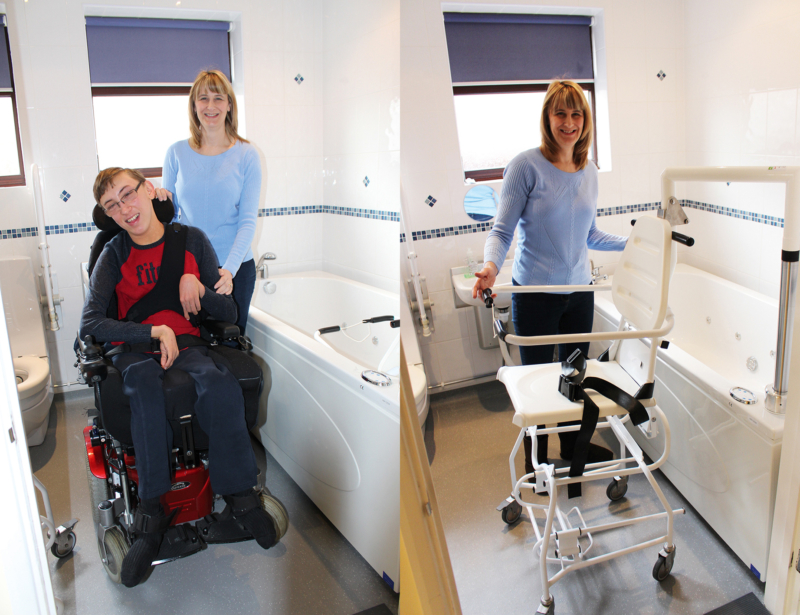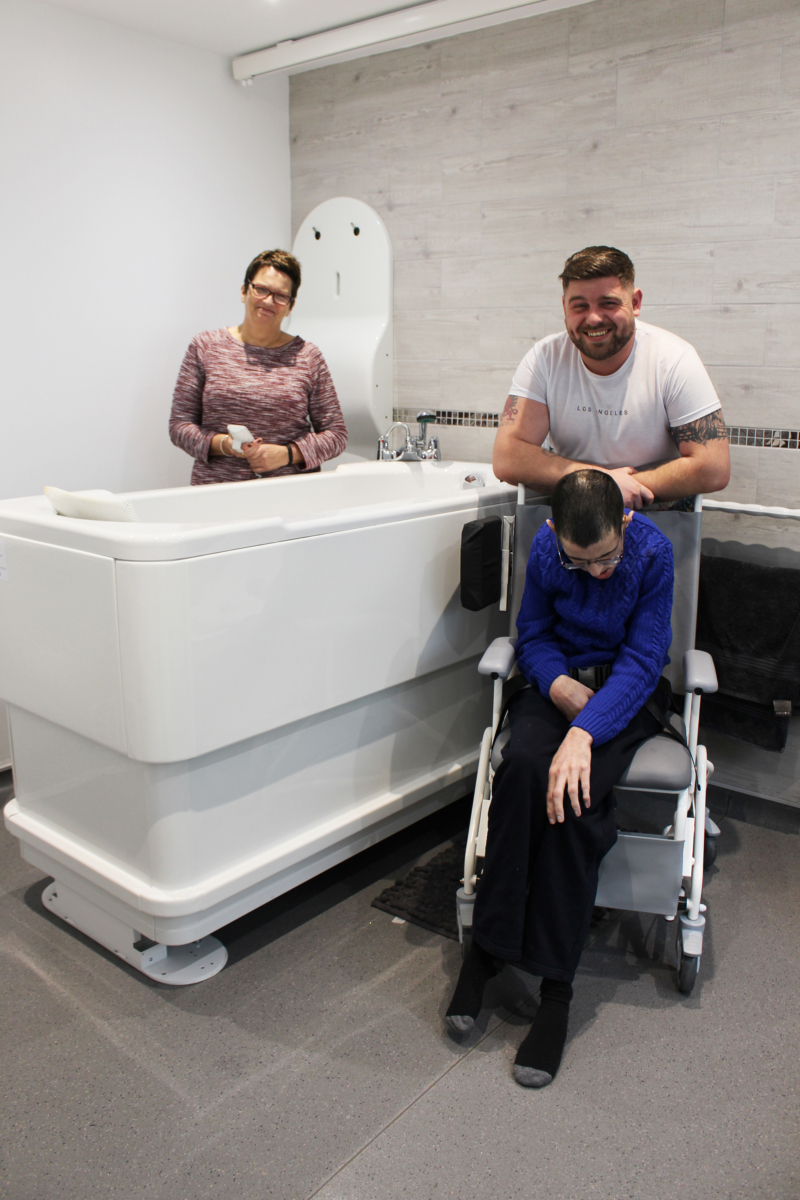Carers and bathing – What about the carers?
Carer’s awareness week is 7th – 13th June 2021 in the UK and this year’s theme focuses on making caring visible and valued. The aim is to highlight the challenges faced and recognise the contribution carers make in helping others.
The Covid-19 pandemic presented new or additional challenges for everyone, but particularly for those who have a caring responsibility for someone needing support. Some carers support individuals with personal hygiene activities such as bathing. However, accessing a bath may have become increasingly challenging to access or use safely and therefore requires an increased physical assistance which could well have a potential negative impact on the carer’s physical and emotional needs.

NHS England has described a carer as ‘someone who looks after a family member, partner and friend who needs help because of their illness, frailty, disability, mental health problem or an addiction and cannot cope without support’ [1]. There is no legal definition of what a carers role would specifically consist of. The type of support and frequency may vary from occasional through to regular daily support. An individual with care needs and their carer are likely to experience role changes and it can be potentially challenging to differentiate between the caring role and the relationship such as a partner, sibling, offspring, or friend [2]. The caring role may have evolved over time or could have occurred suddenly.
Many informal carers do not consider themselves a carer and according to NHS Choices (2014), it can take an average of two years for them to recognise this [3]. The 2011 census highlighted that there were ‘6.5 million unpaid carers in the UK’ [4]. Of the various surveys completed more recently, this figure is now estimated to be considerably higher. Many informal carers were providing care support prior to the pandemic, however in the Carers Week 2020 Research Report [4] it was suggested this had increased since the first national lockdown. A review conducted after six months highlighted 81% of informal carers were now providing a greater amount of care since the original survey [5].

Some carers provide support to an individual with various personal activities of daily living, including washing. Good personal hygiene is important in improving and maintaining a person’s self-esteem and quality of life [6]. One of the Occupational Therapy aims is to have a client centred approach to support individuals with engagement in their occupations [14], such as bathing. This can be a very personal activity and therefore it is essential to be sensitive whilst trying to maintain an individual’s dignity. Everyone has their own values and routines for activities of daily living which need to be considered. Someone’s preference to bathe or shower and how frequently they complete this activity can vary. For example, someone may have always bathed, so therefore this is a familiar routine or perhaps they may feel submerging in water offers them the necessary therapeutic benefits (relaxation, psychological, muscle and joint pain relief). Furthermore, some individuals may find the experience of showering frightening or disorientating [7].
For some requiring care support, transfers to and from the bath or sitting in the bath may have become increasingly difficult or impossible to complete, due to either their own or their carer’s safety being compromised. Providing individuals with the opportunity to access the facilities they desire has the potential to make the washing activity more appealing and comfortable. If the individuals physical and emotional needs are fully met, this will potentially have a positive impact in supporting the carer in their role.

Individuals receiving informal care support without the correct equipment, such as for bathing, will not only impact the individual but the carers too. Additionally, informal carers are at an increased risk of experiencing long-term health problems such as: musculoskeletal conditions; cognitive decline; sleep disruption and cardiovascular disease [11], thus impacting on their quality-of-life outcomes should the appropriate support not be in place (services, financial, equipment etc.). Providing informal care without the right information and support is much harder to sustain long-term. Carers form a critical role in helping make a difference in someone’s life and is fundamental to the health and social care system. An individual’s safety would be at risk if care needs were not adequately met and therefore requiring alternative support, such as residential care or an increased formal care package [9, 10]. Carers UK undertook research in October 2020, which highlighted 58% of the participants physical health had deteriorated since the Covid-19 pandemic [5]. Supporting those who provide unpaid care is hugely important, so they feel valued and respected. Moreover, it also assists in the delivery of care to improve the lives of those requiring care, as well as the carers [2].
Research undertaken by Carers UK in 2020 has shown that unpaid carers report various challenges whilst undertaking a care role. Some of those challenges reported include management of their physical and mental health needs; ability to do paid work; undertake educational studies; financial impact; isolation and loneliness [9]. The Care Act 2014 [12] and Children and Families Act 2014 [13] places a duty to the Local Authority to keep a person’s wellbeing in mind and how it is being impacted. This can include a person’s dignity and choice; physical, emotional wellbeing and relationships. It is imperative informal carer wellbeing should be considered, which should be highlighted from the completion of a carer’s assessment.
Abacus offer various bathing solutions to support an individual’s bathing needs, which in turn offers support to their carer in reducing carer handling tasks. This allows more effective and efficient handling, thus providing a more relaxing experience for the individual and reduces pressure on the carer. This may previously have involved unsafe repetitive tasks requiring bending, twisting, and overreaching. Abacus manufactures adjustable height baths which alleviates the need to bend on the part of the carer, power assisted seats to support the individual’s transfer to and from the bath. There are also options of integrated platforms, which provide the opportunity to reduce the number of transfers required. If a ceiling track hoist or manual hoist is required for an individual’s transfer, this is also possible with Abacus bathing solutions.
References
[1] NHS England; Who is considered a carer; Retrieved from: NHS commissioning » Who is considered a carer? (england.nhs.uk); accessed on 18/05/2021
[2] NHS England; NHS England’s Commitment to Carers (May 2014); Retrieved from: commitment-to-carers-may14.pdf (england.nhs.uk); accessed on 18/05/2021
[3] NHS Choices (2014); Understanding Carers; Retrieved from: http://www.nhs.uk/CarersDirect/understanding-carers/Pages/understanding; accessed on 18/05/2021
[4] Carers UK online; Caring behind closed doors: Forgotten families in the coronavirus outbreak (April 2020) Available from: Caring_behind_closed_doors_April20_pages_web_final.pdf (carersuk.org) accessed on 18/05/2021
[5] Carers UK online; Caring behind closed doors: six months on (October 2020) Available from: Caring_behind_closed_doors_Oct20.pdf (carersuk.org) accessed on 18/05/2021
[6] Nursing Times online; the underlying principles and procedure the bed bathing patients Available from: The underlying principles and procedure for bed bathing patients | Nursing Times accessed on 18/05/2021
[7] Alzheimer’s society online; how to support a person with dementia to wash, bathe and shower available from: How to support a person with dementia to wash, bathe and shower | Alzheimer’s Society (alzheimers.org.uk) accessed on 18/05/2021
[8] Department of Health. (2012) Assessment, eligibility and portability for care users and carers (online) Available from: https://www.gov.uk/government/uploads/system/uploads/attachment_data/file/13645 0/IA-Annex-C-assessment-and-eligibility.pdf accessed on 18/05/2021
[9] Carers UK online; carers week 2020 research report: rise in the number of unpaid carers during the coronavirus outbreak; available from: CW_2020_Research_Report_WEB.pdf (carersuk.org) accessed on 18/05/2021
[10] Informal carers & poverty in the UK: An analysis of the Family Resources Survey (May 2016) available from: Informal carers & poverty in the UK (npi.org.uk) accessed on 20/05/2021
[11] Gov.Uk online; Caring as a social detriment of health: review of evidence available from: Caring as a social determinant of health: review of evidence – GOV.UK (www.gov.uk) accessed on: 18/05/2021
[12] Care Act (2014); available from: Care Act 2014 (legislation.gov.uk) Accessed on: 18/05/2021
[13] Children and Families Act (2014); available from: Children and Families Act 2014 (legislation.gov.uk) ; Accessed on: 18/05/2021
[14] World Federation of occupational therapy (2010) position statement: client centredness in occupational therapy; available from: https://www.wfot.org/assets/resources/Client-centredness-in-Occupational-Therapy.pdfaccessed on: 21/05/2021

